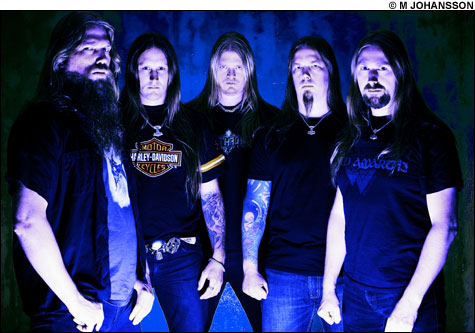
CREDO: “I’m not a religious guy,” says Hegg, “but the whole idea and the whole way of thinking that Vikings had became almost a philosophy of life.” |
When I finally get Amon Amarth vocalist Johan Hegg on the phone, I feel as if I’d woken a giant. It has taken several intrepid attempts by the band’s tour manager, Wolfgang, to summon him from slumber, but when he saunters to the phone to discuss his band’s sacking and pillaging of North America on their current tour with Ensiferum, Belphegor, and the Absence (it comes to the Palladium this Saturday), the towering and intimidatingly bearded frontman is soft-spoken and contemplative. Does he perceive a growing trend of myth-metallers in the last few years, what with bands like High on Fire and the Sword Americanizing myth-laden European truncheon metal? “In a way, yes. There’s a lot of bands out there doing this, and there’s been an increase in the last couple of years. It’s not a problem, though, for us: we know who we are and where we come from, so we’re going to continue to do what we do, and we hope people will remember that.”
You can see where Hegg gets this peace of mind: Amon Amarth have been at it for 16 years, weathering two decades of metal trends. Although they faltered slightly with their aborted first release, 1993’s Thor Arise (which included a cover of Black Sabbath’s “Sabbath Bloody Sabbath” that is significantly less awesome than fellow Swedes the Cardigans’ 1995 version), they went on to perfect their particular brand of epic, mythically accurate chug metal over the course of eight full-lengths, crystallizing their precision and attack on this year’s presciently titled (in this time of financial and socio-political ruination) Metal Blade release Twilight of the Thunder Gods.

Deriving their name from an Elvish-language name for Lord of the Rings’ Mount Doom, Amon Amarth have always catered to a metal audience that craves, along with the bluster and aggression, big sounds and bigger myths. How crucial is the mythology to the music? “I don’t know if the myth is so crucial to it. There’s a lot of interesting subjects in mythology to bring into metal, but I think that ultimately it’s about writing good songs. I never really wanted to preach to anybody when writing our lyrics, or tell anybody what to think, so I try to write metaphorically instead, using mythology to make interesting stories so that people can get something out of it. I get inspired by this stuff; if somebody else gets inspired or gets something out of it, that’s fine. If they just think it’s a cool song, that’s fine as well.”
Referring to an Amon Amarth tune as a “cool song” might be misleading: their music gallops and chugs relentlessly, mercilessly, but always with a keen ear for melodic coherence and choruses that bring everything together in a whirlwind of speed, emotion, and careering sing-along. Mr. Hegg is like a field general at war; he’s there at the forefront with his woolly-mammoth growl, grounded, never floating away from the fray.
No surprise, of course, that his adoption of the Viking æsthetic has endowed him with a protective attitude against misrepresentations of the culture. “I think that Vikings have inherited a very bad reputation, mainly from Christians, who have an agenda, obviously, of describing the Vikings as brutal savages and what not. And that’s not true, Vikings were very sophisticated, you know?
“I’m not a religious guy — but the whole idea and the whole way of thinking that Vikings had appealed to me and became almost a philosophy of life. It’s definitely something I carry with me, and I think it’s an interesting view upon life that I feel very comfortable with — it’s very simple and straightforward.”
Various warrior themes always fit well into metal, what with its narrative of fighting mainstream antipathy and flying down an icy highway to sack another village and revel in conquest. But Hegg sees the Viking code as much more altruistic: “The Viking philosophy is basically this: be loyal to your friends and family, and try to leave a good name for yourself when you die. And the way to do that is to behave like a good person to the people around you; it’s as simple as that.” (Surely there must be some loophole buried in there regarding laying waste to kingdoms and countrysides.)
“But it’s also about standing up for what you believe in, for your ideas. I mean, obviously you shouldn’t be boneheaded, you should be open-minded, as well. Also you need a lot of tolerance. I think, in general, people are getting more and more open-minded. But religion is really something that makes people more narrow-minded and prejudiced. I’m not saying that I’m more right that anyone else — you are entitled to any belief you have — but this is what is right for me. Religion is definitely not a good thing in my book.”
AMON AMARTH + ENSIFERUM + THE ABSENCE + BELPHEGOR | Palladium, 261 Main St, Worcester | October 18 at 8 pm | $20-$25 | 800.477.6849 or www.thepalladium.net